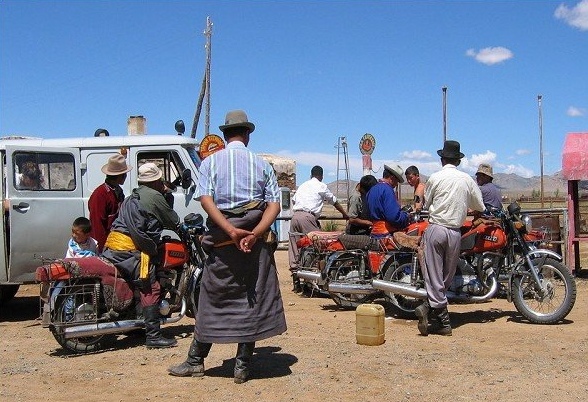The 2-wheeled nomads of Tibet
“You’re only a real nomad if you ride
a horse,” said one man, Tsendo, as he sat in a hillside tent a two-hour
drive from the nearest town. Then, glancing at a motorcycle parked inside the
tent, he laughed and added, “But this is our horse.”

At the Doulong Store, the musty shelves are stocked with the necessities for Tibetan nomads. There are kettles for yak butter tea and bolts of colorful fabric for traditional robes and clothing. A nomad affluent enough to use a light bulb in his tent can buy an electric generator.
But an unexpected necessity here in the immense grasslands of the Tibetan plateau are the six motorcycles on display, including the Asiahero Alt 150-7 bought by a nomad named Trashi Dorjay. He had traveled almost 320 kilometers, or 200 miles, to the store from his tent because he wanted a bike to herd his sheep and yaks.
“I used to ride a horse,” he explained. “A motorcycle is faster.”
“You’re only a real nomad if you ride a horse,” said one man, Tsendo, as he sat in a hillside tent a two-hour drive from the nearest town. Then, glancing at a motorcycle parked inside the tent, he laughed and added, “But this is our horse.”
Many nomads credit China’s economic changes for the arrival of the motorcycle. Under the old system, nomads raised their yaks and sheep in a collective and were required to sell certain numbers of animals at a set price to government agencies.
But by the late 1980s, nomads could sell their yaks and sheep at a higher market price. This remains one of China’s poorest areas, but over the years some nomads were able to save enough money to buy motorcycles.
More recently, the arrival of cheaper, Chinese-made models costing about $600 has made motorcycles more affordable. A used model can be bought for $50, and nearly every crossroads in the region seems to have a motorcycle repair or sales shop.
Been saving this for a weekend. Nice, detailed article about the passing of a way of life that was romantic — at least to outsiders who didn’t have to put up with it.
The best of any lifestyle can pass through qualitative economic changes, adapt and thrive. Winess the Buddhist priest with a jeep in the article. Proto-Luddites get their shorts all wrinkled when people use machines instead of animals; but, strangely enough, I always find they never had to spend much of their youth plowing behind a mule — or for that matter, operating a punchpress in a factory.
Posted: Sun - August 6, 2006 at 07:17 AM